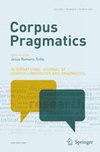基于语料库的在线新闻读者对雅加达市长在新冠肺炎疫情期间采取的政策的评论研究
IF 1
0 LANGUAGE & LINGUISTICS
引用次数: 0
摘要
摘要:该研究调查了发表在政治新闻文章上的评论,这些评论主要是由读者的政治两极分化观点引起的负面批评。该调查采用词汇和语用分析的方法,分析了Detiknews网站上发表的882篇读者评论,这些评论涉及雅加达市长为应对最近的冠状病毒病(COVID-19)爆发所采取的政策。在语料库的基础上,我们从词频、负面批评背后的言语行为和评论者的立场三个方面考察了负面批评的语言表达。检查结果显示,批评中出现频率最高的词包括名词、代词和否定词汇。总的来说,这些词被评论者用来强化他们负面批评的影响。同时,批评背后最主要的言语行为是评价性的。在这种情况下,由于言语行为与立场角色之间的一对一关系,作为法官的评论者也是最主要的角色。这些评论对雅加达省长提出了负面批评,主要是由于他们不同的政治观点。本文章由计算机程序翻译,如有差异,请以英文原文为准。
A Corpus-Based Study of Readers’ Comments on Online News on the Policies Adopted by the Jakarta Governor During the COVID-19 Pandemic
Abstract The study examined comments posted on political news articles that generated negative criticism driven primarily by the politically polarized views of the readers. The investigation employed lexical and pragmatic analyses to probe a corpus of 882 reader comments posted on the Detiknews website news articles regarding the policies adopted by the Jakarta governor to handle the recent coronavirus disease (COVID-19) outbreak. Based on the corpus, we examined the linguistic expression of negative criticism from word frequency, the speech acts underlying the negative criticism, and the stances of the commenters. The results of the examination revealed that the most frequent words of the criticism comprised nouns, pronouns, and negation lexis. Overall, such terms were used by commenters to intensify the impact of their negative criticism. Meanwhile, the most dominant speech act underlying the criticism is evaluative. In this case, the commenters functioning as judges is also the most dominant role because of the one-to-one relationship between the speech act and the stance-taking role. Such commenters produced negative criticism on the Jakarta governor, driven primarily by their different political views.
求助全文
通过发布文献求助,成功后即可免费获取论文全文。
去求助
来源期刊

Corpus Pragmatics
Arts and Humanities-Language and Linguistics
CiteScore
2.60
自引率
0.00%
发文量
15
期刊介绍:
Corpus Pragmatics offers a forum for theoretical and applied linguists who carry out research in the new linguistic discipline that stands at the interface between corpus linguistics and pragmatics. The journal promotes the combination of the two approaches through research on new topics in linguistics, with a particular focus on interdisciplinary studies, and to enlarge and implement current pragmatic theories that have hitherto not benefited from empirical corpus support. Authors are encouraged to describe the statistical analyses used in their research and to supply the data and scripts in R when possible. The objective of Corpus Pragmatics is to develop pragmatics with the aid of quantitative corpus methodology. The journal accepts original research papers, short research notes, and occasional thematic issues. The journal follows a double-blind peer review system.
 求助内容:
求助内容: 应助结果提醒方式:
应助结果提醒方式:


